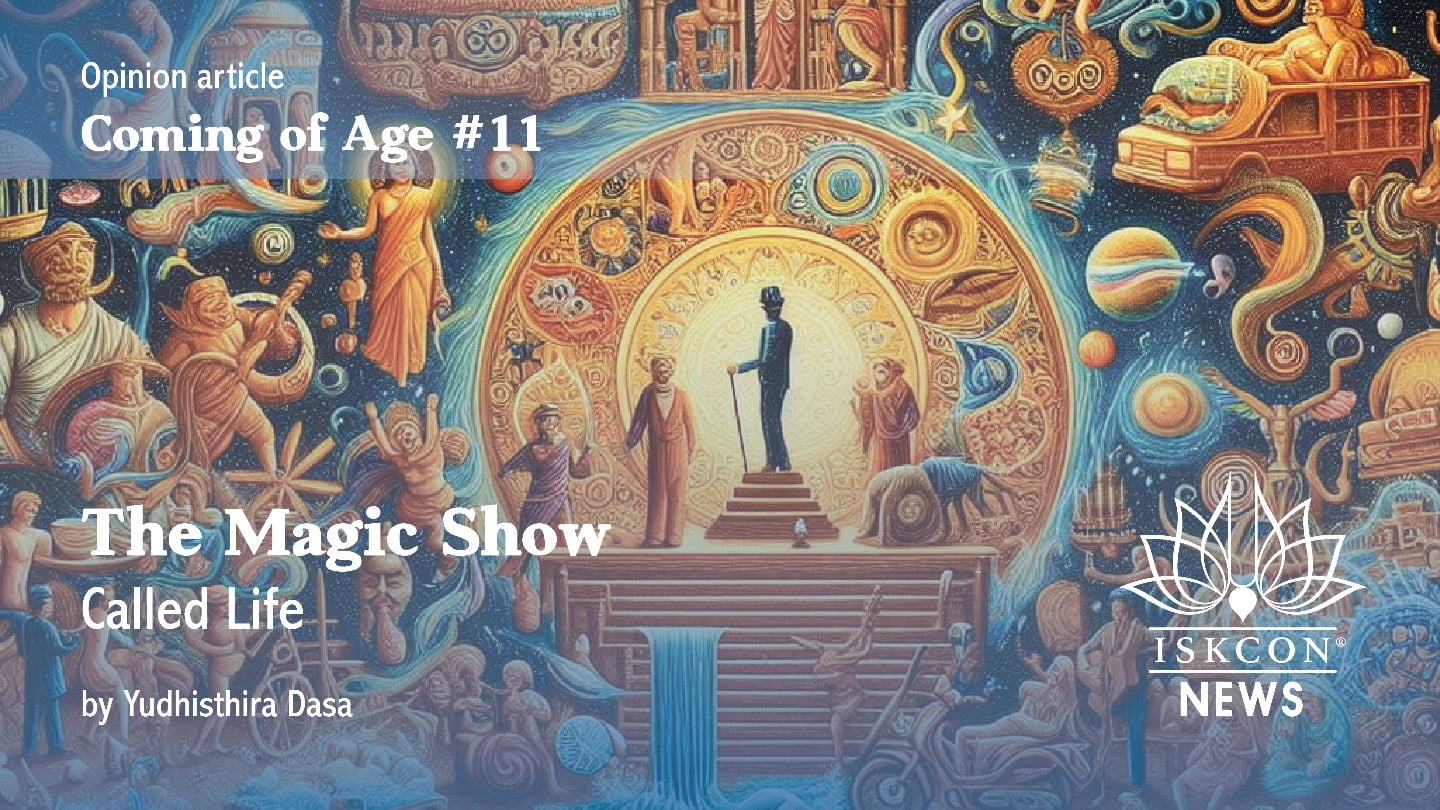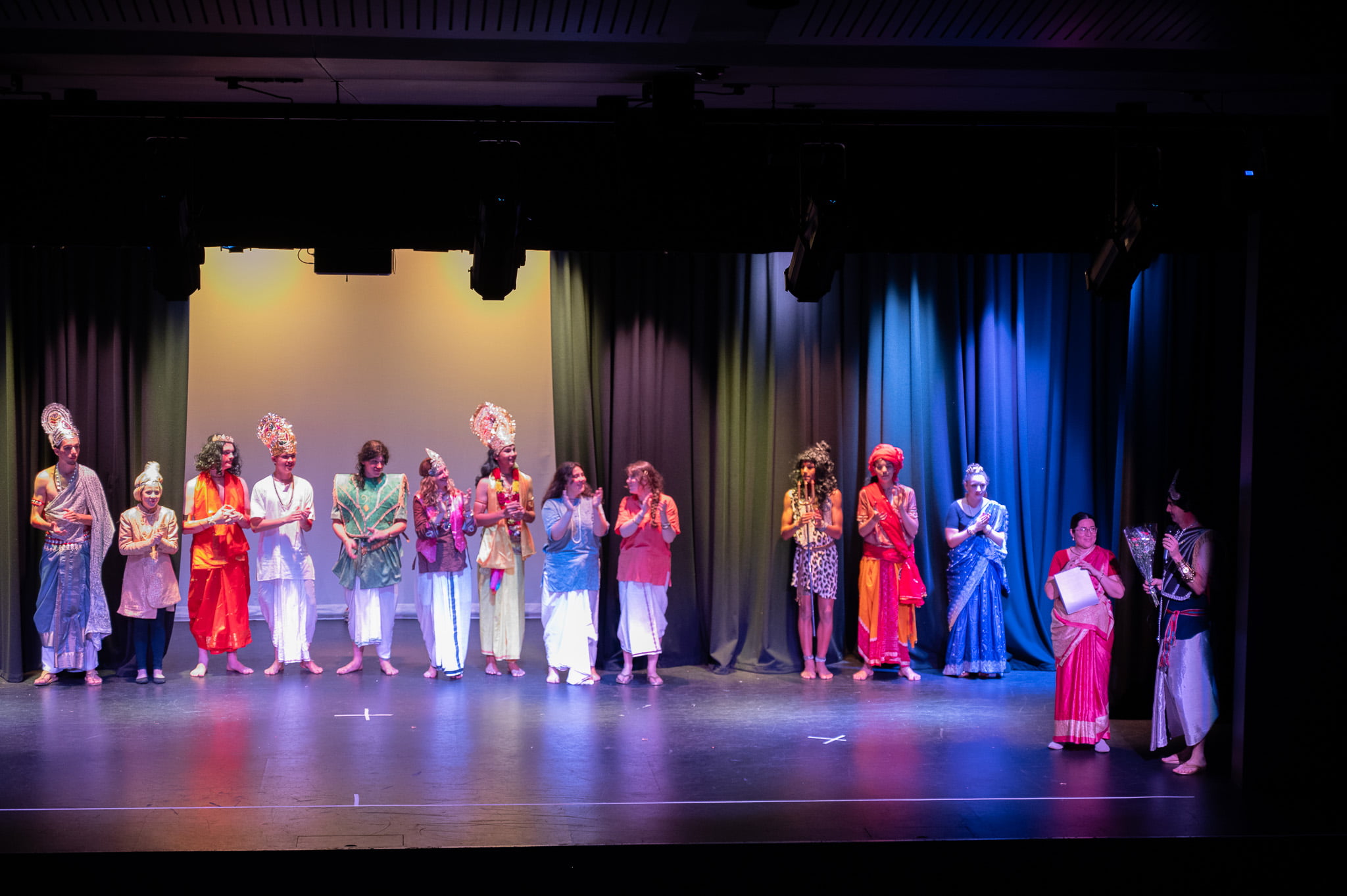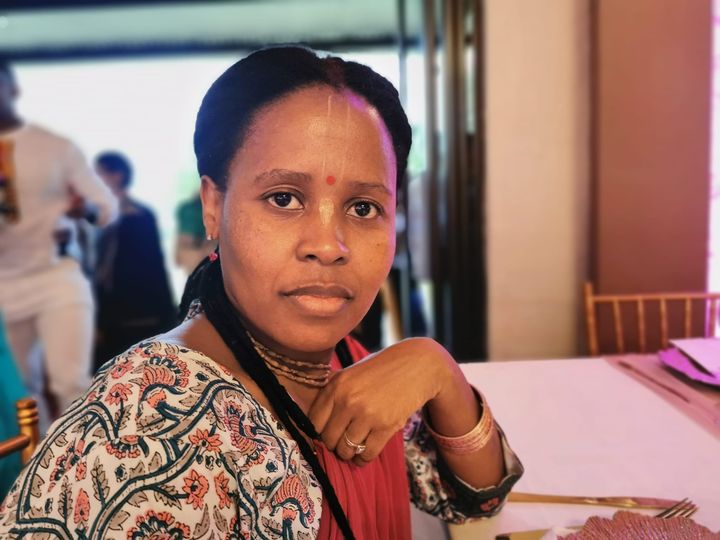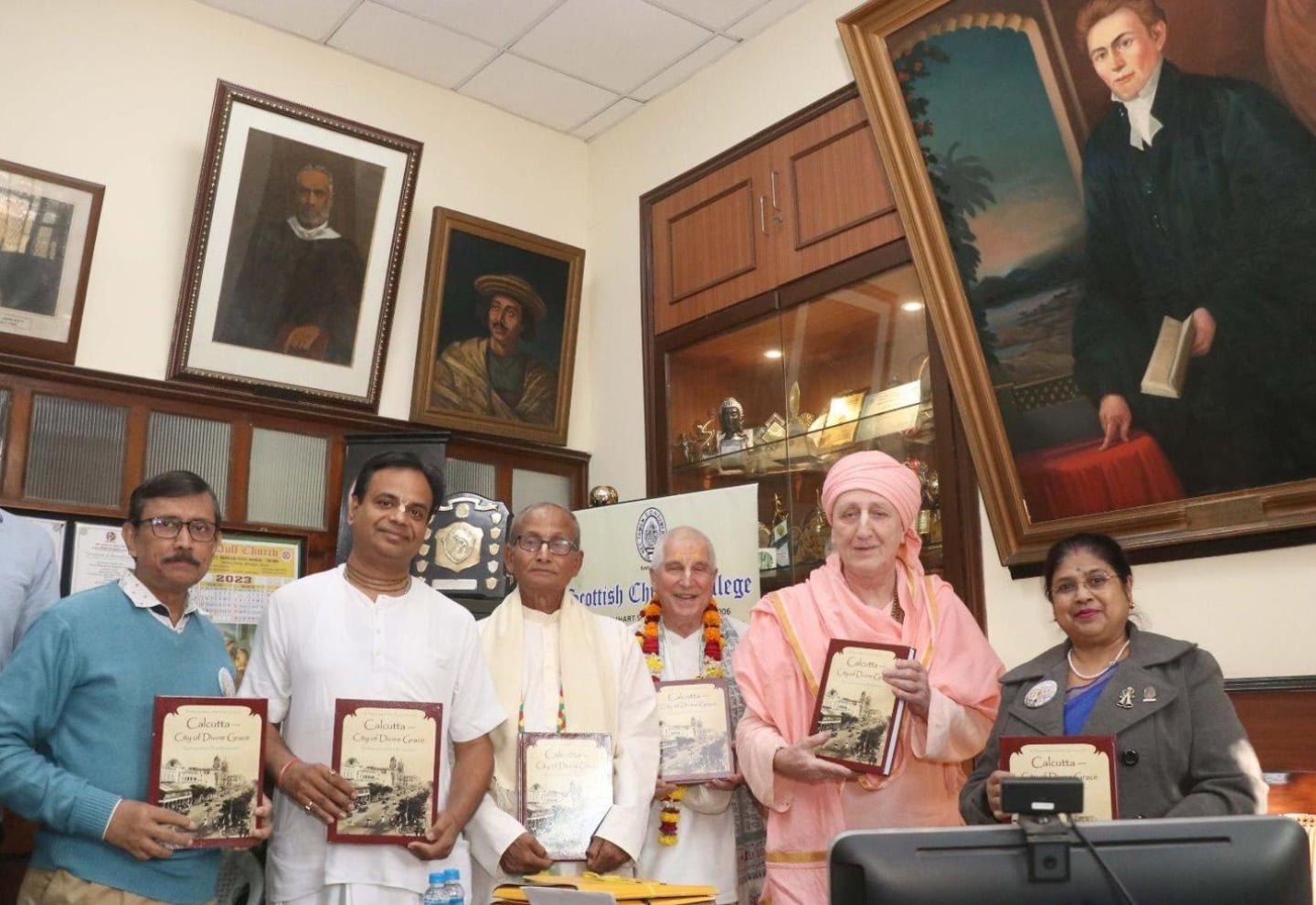GBC Amends and Affirms Law Allowing Vaisnavis To Initiate
By ISKCON News Staff | Dec 22, 2021
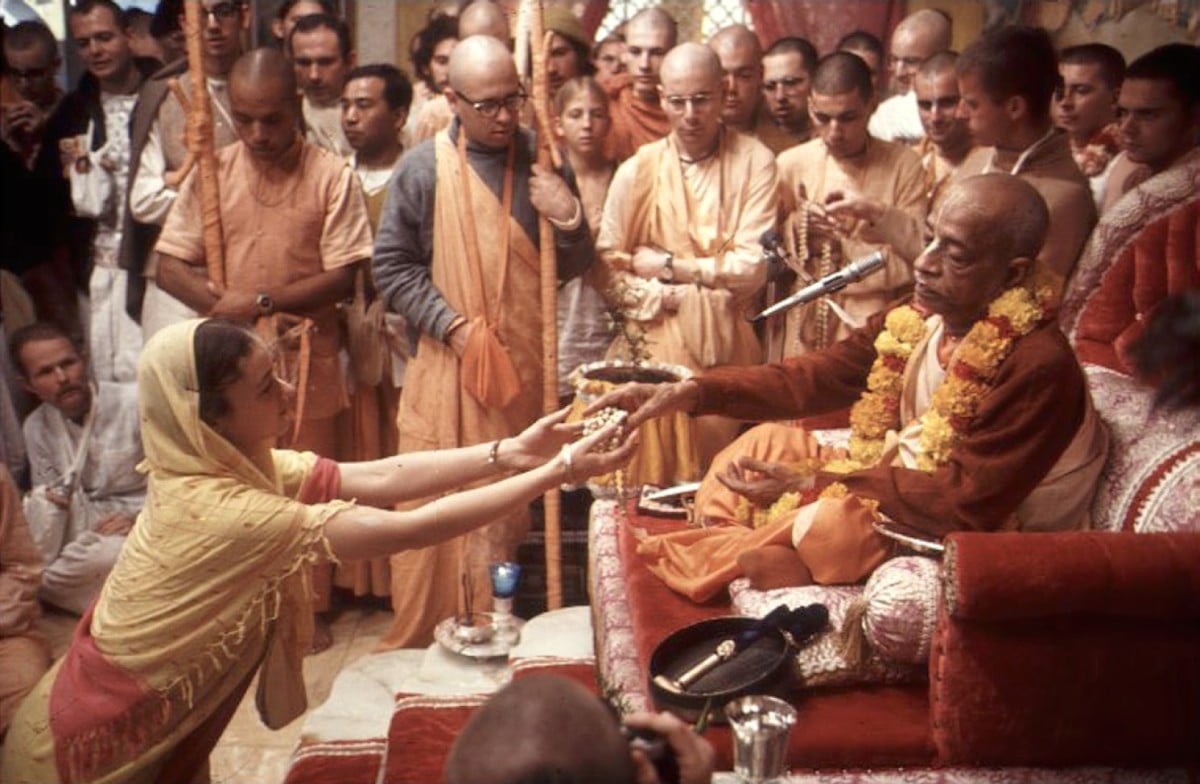
Per GBC policy the resolution described below can not go into effect until reviewed by the SABHA.
December 22, 2021—The Governing Body Commission (GBC) of ISKCON today passed a resolution amending a 2019 law affirming that qualified Vaisnavis, or women devotees, may under certain conditions, initiate disciples (give diksa) within the International Society for Krishna Consciousness.
Of the 28 voting GBC members present for the tally, the vote was 18 in favor, 2 opposed, and 8 abstentions. In other words, 64% of GBC members voted in favor of the proposal.
The earlier 2019 Law resolved that “Vaisnavis are eligible to give diksa in ISKCON” but was not enacted because the GBC agreed to first enter into a formal dialogue with representatives of the India Bureau, some of whom had raised objections to the 2019 decision.
Since then, four members of a GBC subcommittee met with four senior members of the India Bureau more than two dozen times, to listen to their concerns and consider amendments to the law based on their input.
“We wanted to ensure that the GBC clearly heard the viewpoints and issues raised by the Bureau members,” said Brahmatirtha das, a representative of ISKCONResolve who specializes in mediation. “Myself and my colleague, Sri Prathamesh Popat, from Mumbai, who was nominated by the India Bureau to co-facilitate the meetings, worked diligently to ensure that all voices and perspectives were heard over the many months the two groups met.”
Today’s GBC decision was denoted as a “Culturally Sensitive Resolution.” In short, ISKCON Regional Governing Bodies (such as the India Bureau) may, under specific conditions, choose to opt out of the policy for their area based on it being culturally sensitive. This is the first ever GBC resolution designated as culturally sensitive, under a law passed just a few weeks ago.
The Amended law highlighted several points that arose from the GBC-Bureau discussions:
- Regional Governing Bodies (or National Councils where there is no RGB) may opt out of this policy
- With the authorization of their RGB, an individual country may also opt out
- If a Region opts out, a 2/3 majority vote of that RGB may still approve a specific Vaishnavi to initiate in their Region.
Requirements for Vaisnavi gurus that were established in the 2019 law remain, specifically that Vaisnavis who initiate must meet all standard qualifications for diksa-guru applicants; be at least 55 years of age; be living in a stable family situation, or have the protection of senior Vaisnava or Vaisnavi sanga.
The debate over whether women can serve as diksa gurus has yielded extensive papers and arguments on both sides of the matter. The topic has been the focus of multiple GBC meetings, debates and dialogues for more than 15 years, including a three-day GBC retreat in Tirupati, India, dedicated to the topic.
Today’s decision balances the concerns of those who oppose Vaisnavi diksa gurus—by allowing Regions to opt out, while allowing for Vaisnavis to initiate in all other parts of the world. It affirms the GBC’s previous decisions that to have Vaisnavis serve as diksa gurus is authorized in sastra, acceptable in Vaisnava culture, and is the desire of ISKCON’s Founder-acarya, His Divine Grace Srila Prabhupada.
Appendix:
The full Resolution of the GBC Body on Vaisnavi Diksa Gurus, December 22, 2021, is:
Proposal to Amend GBC Resolution 701.6, of 2019: “ISKCON Spiritual Masters, Vaisnavi Diksa-gurus“
Proposed by the GBC Vaishnavi Diksa Guru Committee
Presentation of Proposal:
Whereas the GBC put in abeyance the 2019 Vaishnavi Diksa Guru resolution so that the GBC and the Indian Bureau could discuss the topic in more detail,
Whereas representatives of the Bureau and representatives of the GBC met jointly more than two dozen times over the period of a year,
Whereas those meetings were facilitated by professional mediators, including a mediator chosen by the Bureau, and another mediator who is a senior member of ISKCONResolve,
Whereas the GBC representatives made a sincere effort to hear and understand the concerns and opinions of the Bureau representatives,
Whereas the GBC representatives noted that they valued the time spent with the Bureau members, and that they now better understand the views of the Bureau representatives after those meetings,
Whereas the GBC delegation concluded that further meetings, or additional study of the matter, would not provide new insights,
Whereas the GBC delegation reported that, based on these discussions, some clarifications of the 2019 Resolution on Vaishnavi Diksa Gurus are required, 701.6, “ISKCON Spiritual Masters, Vaisnavi Diksa-gurus—2019.”
Whereas the GBC, in its November 17, 2021, meeting, determined that on rare occasions a GBC Resolution may be certified as a Culturally Sensitive Resolution, and thus, within specific GBC guidelines, that Resolution may be applied differently across ISKCON regions,
Whereas in 2009 the GBC Resolved (Female Diksa Gurus):
The GBC accepts the philosophical conclusion presented in the SAC’s Female Diksa
Guru Paper that a mature, qualified, female devotee may accept the role of an initiating spiritual master.
The GBC Body authorizes local area committees to put forward for approval as initiating guru any devotee in their area, male or female, who is qualified according to existing GBC Law.
Whereas, the GBC has worked to achieve consensus and implementation of this resolution for many years, including the above mentioned extensive dialogues with representatives of the India Bureau;
Therefore, the Resolution regarding Vaisnavi Diksa Gurus of 2019, 701.6, “ISKCON Spiritual Masters, Vaisnavi Diksa-gurus—2019” is amended and replaced by the following:
Vaisnavis are eligible to give diksa within ISKCON provided that they:
- Meet all the qualifications listed for ISKCON diksa-guru applicants;
- Are at least 55 years of age.
- Are in a stable family situation living under the protection of a husband, elder son or son-in-law, qualified householder couple or senior Vaisnava or Vaisnavi sanga;
- After five years the GBC shall review this resolution to determine if the number of Vaisnavis initiating in any region, or as a total for the world, is in keeping with Srila Prabhupada’s indication of “not so many.”
Prof. O’Connell: Is it possible, Swamiji, for a woman to be a guru in the line of disciplic succession?
Prabhupāda: Yes. Jāhnavā devī was—Nityānanda’s wife. She became. If she is able to go to the highest perfection of life, why it is not possible to become guru? But, not so many. Actually one who has attained the perfection, she can become guru. But man or woman, unless one has attained the perfection… Yei kṛṣṇa-tattva-vettā sei guru haya [Cc. Madhya 8.128].
Furthermore, this resolution is designated as a “Culturally Sensitive Resolution.” Per GBC law:
A Regional Governing Body (RGB), or where there is no RGB, an authorized national council with the support of their GBC, or where a national council has more than one GBC, a majority of their GBCs, may apply to the GBC Body with a request to modify a culturally sensitive resolution for their area/yatra. Such a request must include the details of the specific adjustment/s they propose to make, as well as the reasons for requesting such an adjustment/s.
The GBC Body will give guidelines and set out the parameters regarding what may or may not be adjusted within a culturally sensitive resolution…. Any details, guidelines, parameters, timelines, etc., in regard to its exceptional status must be recorded within the resolution itself.
Thus, by designating this as a Culturally Sensitive Resolution, the GBC hereby establishes that an RGB or other authorized ISKCON leadership body as denoted in the above referenced law—may opt out of this mandate and choose to not allow any Vaisnavis to initiate within their jurisdiction. Any given RGB that does not opt out and proceeds to fully implement this resolution, may, at their discretion, allow any given country within their region to opt out of applying this resolution. Naturally that would only be done after very careful consideration, as the default position is to always fully implement GBC resolutions.
In those regions or countries that choose to opt out, if a particular candidate for diksa guru is approved by a special 2/3 vote of that RGB, or other authorized body, per above, then she shall be accepted as a diksa guru in that region or country.
A decision to opt out must be reaffirmed by that RGB, or authorized body per above, every five years. No other adjustments to this resolution are authorized or will be permitted.
This resolution lifts the abeyance on this matter stated in resolution 310 of 2015.
The decision by the GBC to engage in dialogue with the India Bureau prior to enacting the 2019 decision is below:
Title – Plan for dialogue on GBC Resolution 701.6, “Vaisnavi Diksa-gurus – 2019” – 2020
RESOLVED:
That a dialogue on this topic take place as per the request of the ISKCON India Bureau and a number of GBCs during the joint brainstorming session on February 4.
The GBC shall make a final decision on any amendments to resolution 701.6, “ISKCON Spiritual Masters, Vaisnavi Diksa-gurus–2019”, in Pune at the 2020 GBC Mid-term General Meeting.
Note: Due to Covid-19 the Pune Meeting was canceled and the amended law was brought forward for voting on December 22, 2021.



